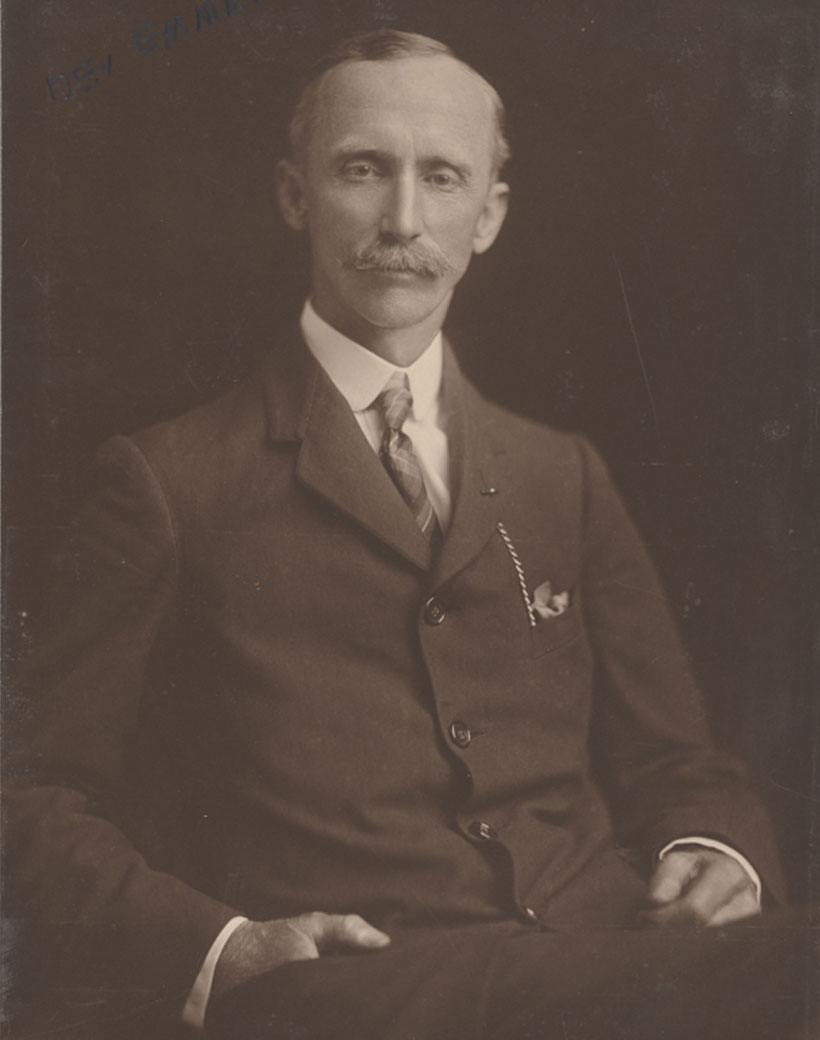Devereux Emmet
A member of a wealthy New York family who went on to work with C.B. Macdonald and become one of the state’s most prolific Golden Age architects.

December 11, 1861, Pelham, New York, USA
December 30, 1934, Garden City, New York, USA
Superintendent Series: Bob Ranum on Garden City and Mike Strantz
Born in 1961, Devereux Emmet grew up in a wealthy family that traveled frequently and mingled with the elite of New York City. A year after Emmet graduated from the School of Arts at Columbia University in 1883, he found himself in North Berwick, Scotland, where he became interested in golf. He went back to Columbia to receive a law degree in 1885 before marrying Ella Smith, daughter of another wealthy NYC family, in 1889. Representative of the circles he traveled in, Emmet’s new brother-in-law was renowned architect Stanford White, who would later renovate the Emmet family’s estate home, Sherrewogue, on Stony Brook Harbor in 1895. In addition to having a passion for golf, Emmet was a dedicated huntsman. He bought and raised hunting dogs in the U.S. and sold them to clients in Ireland.
In 1897, while serving as vice president of the Garden City Company, an organization responsible for developing its namesake Long Island town, Emmet received his first opportunity to lay out a golf course, the nine-hole Island Golf Links. He expanded the course two years later, forming Garden City Golf Club. One of the founding members of Garden City was Charles Blair Macdonald, who became friends with Emmet. In preparation for Macdonald’s project at the National Golf Links of America, Emmet surveyed “ideal holes” in Great Britain and Ireland for him. He also made recommendations during NGLA’s construction. The success of Garden City led to a number of design commissions for Emmet in the state of New York, including Mohawk Golf Club (1907), Leatherstocking Golf Course (1909), Huntington Country Club (1910), Mahopac Golf and Beach Club (1913), and Wheatley Hills Golf Club (1913).
As a player, Emmet’s greatest accomplishment was reaching the quarterfinals of the 1904 Amateur Championship at Royal St. George’s Golf Club. His success as an amateur player even ruffled some feathers. In the wake of his win at a 1916 father-son tournament at Sleepy Hollow Country Club, the USGA announced its controversial “architects rule,” declaring that golf architects could compete only as professionals, not amateurs.
Emmet’s design career continued during and after World War I, with Hartford Golf Club (two courses, 1914), Cherry Valley Club (1916), St. George’s Golf and Country Club (1917), Rye Golf Club (1920), Bonnie Briar Country Club (1921), the Country Club of Farmington (1921), and McGregor Links Country Club (1921). He also conducted renovations at Rockaway Hunting Club (1917), Pelham Country Club (1920), and Engineers Country Club (1921).
In 1924, Emmet announced that Alfred H. Tull, an Englishman with construction experience under Walter Travis and A.W. Tillinghast, would join his firm as an associate. The same year, Emmet completed original designs at Congressional Country Club, Rockville Links Club, and Wee Burn Country Club. With Tull supervising on the grounds, Emmet designed Schuyler Meadows Club (1927), Kenny Park Golf Course (1927), The Seawane Club (1927), Bedford Golf and Tennis Club (1928), Cape Cod Country Club (1928), and Huntington Crescent Club (1931).
Emmet passed away in late 1934 in Garden City, not far from his debut masterpiece, leaving behind a legacy as New York State’s most prolific Golden Age golf architect.
St. George’s Golf & Country Club (NY)
Devereux Emmet's Long Island masterpiece, St George's features varied, unforgettable golf holes and a thrill-ride of a closing stretch
St. George’s Golf & Country Club (NY)
Congressional Country Club (Blue Course)
Recently redesigned by Andrew Green, Congressional Blue is a brawny modern championship venue with clever design, state-of-the-art conditioning, and a somewhat artificial aesthetic
Congressional Country Club (Blue Course)
Cape Cod Country Club
Devereux Emmet and his design partner, Alfred Tull, draped a wonderfully strategic golf course here over hilly, sandy-soiled terrain, but this gem’s future is in limbo
Cape Cod Country Club


Leave a comment or start a discussion
Engage in our content with thousands of other Fried Egg Golf Members
Engage in our content with thousands of other Fried Egg Golf Club Members
Get full access to exclusive benefits from Fried Egg Golf
- Member-only content
- Community discussions forums
- Member-only experiences and early access to events












Leave a comment or start a discussion
Lorem ipsum dolor sit amet, consectetur adipiscing elit. Suspendisse varius enim in eros elementum tristique. Duis cursus, mi quis viverra ornare, eros dolor interdum nulla, ut commodo diam libero vitae erat. Aenean faucibus nibh et justo cursus id rutrum lorem imperdiet. Nunc ut sem vitae risus tristique posuere. uis cursus, mi quis viverra ornare, eros dolor interdum nulla, ut commodo diam libero vitae erat. Aenean faucibus nibh et justo cursus id rutrum lorem imperdiet. Nunc ut sem vitae risus tristique posuere.